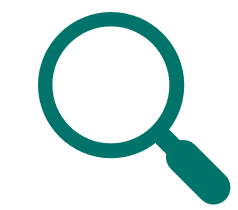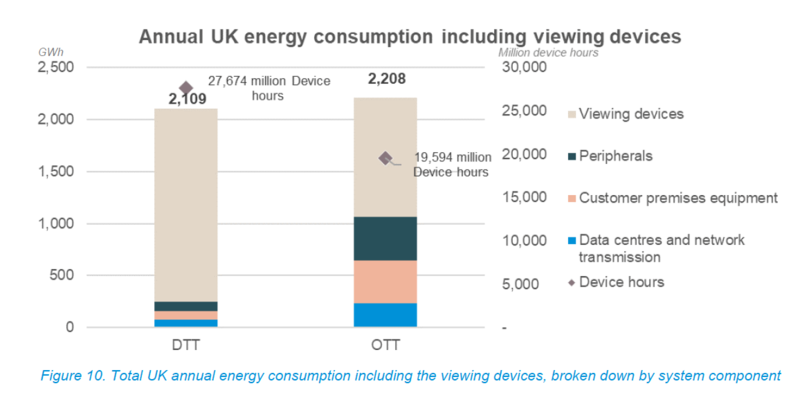Search
News categories
Ofcom (UK): new report on emissions of OTT and DTT services
Climate change and increasing energy costs: the carbon impact of TV distribution
 Ofcom recently commissioned a research from Carnstone to look at the energy consumption between Over-the-top (OTT) and Digital Terrestrial Television (DTT) services for TV distribution in the UK. Published on 28 October 2022, the report takes a snapshot of carbon emissions of viewing on both types of distribution in 2021 and aims to understand what factors are most significant in driving energy consumption.
Ofcom recently commissioned a research from Carnstone to look at the energy consumption between Over-the-top (OTT) and Digital Terrestrial Television (DTT) services for TV distribution in the UK. Published on 28 October 2022, the report takes a snapshot of carbon emissions of viewing on both types of distribution in 2021 and aims to understand what factors are most significant in driving energy consumption.
Background
- Although Ofcom does not have statutory duties to consider environmental sustainability issues, the regulator recognises the importance of understanding factors which affect the stakeholders
- The research employs an attributional approach – allocating the energy consumption of shared infrastructure on the use-phase only and based on the average viewing hours on the different platforms.
Key Takeaways
- For both OTT and DTT services, most of the energy consumption is within the home rather than in the distribution system – TV sets, viewing devices, and in-home networks account for 90% of the energy used.
- Some devices used within the home, such as Wi-Fi networks and set-top boxes, are usually always-on and consuming power (albeit apparently low) – adding up to a significant proportion of this figure.
- Outside of the home, the network transmission uses six times more energy for OTT based on today’s volume of viewing, noting however that for both technologies - OTT and DTT - it is not a very large driver of overall energy use.
- The report confirms that TV viewing is a relatively low source of emissions overall:
- One hour of viewing TV via terrestrial networks has an energy consumption of 9.1Wh whilst for streaming, this is 54Wh. In other words, viewing TV for an hour is approximately the same as boiling water for around 3-4 cups of tea.
- DTT as a distribution method is currently more efficient and less energy consuming than IP-delivered content. However, most of the DTT's energy/emissions is from viewing devices (whereas viewing devices account for just half of annual OTT energy consumption as these devices are smaller).
OTT's network transmission consumes much more energy than DTT's network transmission. However, the average viewing hours are, today, higher with DTT as well as the energy consumption of the devices used (TV sets consumes more energy than small devices such as smartphones or tablets).
- Networks have become more efficient overall, not by reducing absolute energy consumption, but by serving more data traffic with a similar amount of energy.
Implications and recommendations
- The study confirms the findings of similar studies*.
- The attributional approach, widely accepted to be the best method to obtain a snapshot of energy consumption, allocates emissions for viewing in the past. It cannot be used to accurately speculate on future changes to energy and emissions.
- Therefore, it remains unclear what are the energy implications of changing traffic volumes and peaks over time. Standardised data from operators would help in this regard.
- Households will not necessarily save energy by switching from streaming to DTT, unless they also switch off their routers or use fewer or no wifi repeaters.
* DIMPACT’s 2021 paper entitled the Carbon Impacts of Video Streaming (an initiative of media and technology companies interested in measuring emissions of streaming), the BBC’s White paper 372 which evaluated the impacts of distribution platforms and the LoCAT Project – a quantitative study commissioned by a consortium of players in the European TV market to analyse the impacts and GHG emissions of OTT and DTT services.
- The report "Carbon emissions of streaming and digital terrestrial television" by Carnstone
- News from Ofcom
 If you are interested in this research and would like to know more, please contact Jordan Ogg (International Policy Manager - Ofcom): Jordan.Ogg@ofcom.org.uk
If you are interested in this research and would like to know more, please contact Jordan Ogg (International Policy Manager - Ofcom): Jordan.Ogg@ofcom.org.uk Source: Ofcom (UK)
Countries
See also
- BAI (IE): A sustainability roadmap for the Irish broadcasting sector posted on 05 February, 2021 01:00
